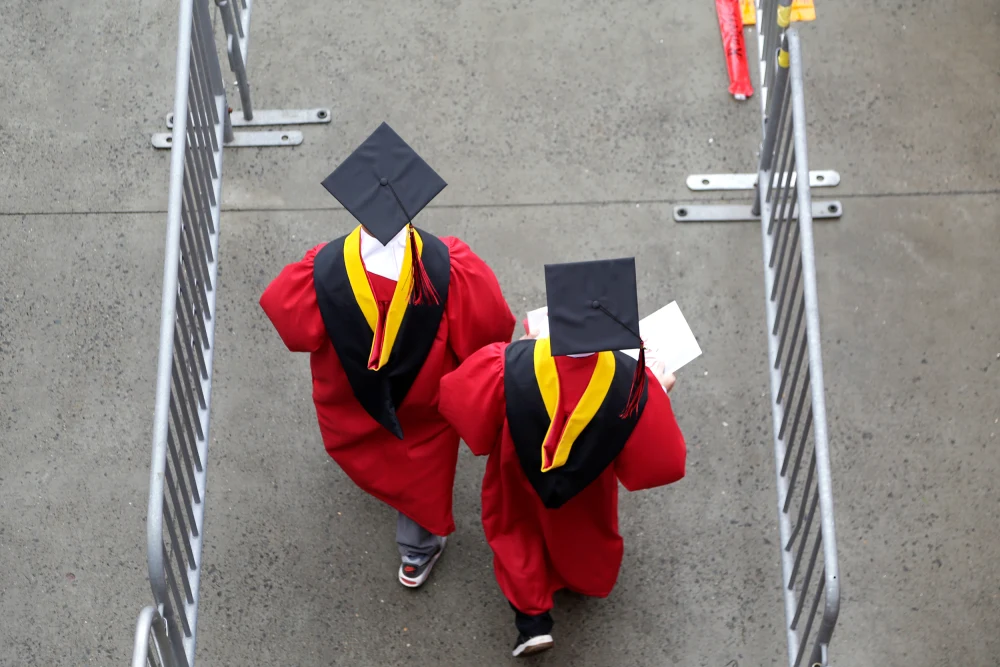This year’s new college graduates are heading into a tougher job market than last year’s — who had it worse off than the class before that — just as the Trump administration cracks down on student loan repayments.
Recent grads’ unemployment rate was 5.8% as of March, up from 4.6% a year earlier, the Federal Reserve Bank of New York reported last week. The share of new graduates working jobs that don’t require their degrees — a situation known as “underemployment” — hit 41.2% in March, rising from 40.6% that same month in 2024.
“Right now things are pretty frozen,” Allison Shrivastava, an economist at Indeed Hiring Lab, said of entry-level prospects. “A lot of employers and job seekers are both kind of deer-in-headlights, not sure what to do.”
That squares with Julia Abbott’s experience.
“I just feel pretty screwed as it is right now,” said the psychology major who’s graduating this month from James Madison University in Harrisonburg, Virginia. She said she’s applied to over 200 roles in social media and marketing, but “minimal interviews come out of it.”
Internship postings typically rise sharply in early spring, but they’re lagging 11 percentage points behind last year’s levels, Indeed said in April. The hiring platform sees demand for interns as a stronger gauge of new grads’ job prospects than entry-level postings, which increasingly target people with at least a few years’ experience.
In a worrying sign for the class of 2025, internship openings are “far below where they were in 2023 and 2022, when the labor market was exceptionally competitive,” Shrivastava said.
Young college grads have historically seen lower unemployment levels than the labor force overall, and they still do. But as The Atlantic pointed out Wednesday, this gap has narrowed to a record low, taking some of the shine off the traditional benefits of a bachelor’s degree.
Meanwhile, the Trump administration is restarting the “involuntary” repayment of federal student loans in default, a move that could sap money from paychecks, tax refunds, Social Security payments and disability and retirement benefits from millions of borrowers.
Repayments were paused during President Donald Trump’s first term in 2020 in response to Covid-19. The pandemic-era reprieve from forced collections ends Monday, just as a new TransUnion report finds a record share of federal student loan borrowers are 90 days or more past due and at risk of default — at 20.5% as of February, up 10 percentage points from five years earlier.
The debt crackdown comes as workers across the labor force confront a tougher hiring landscape. Employers added a better-than-expected 177,000 jobs in April, government data showed Friday, but analysts were quick to flag warning signs ahead.
Average pay growth has slowed to a crawl, and unemployment metrics indicate it’s taking longer for people looking for work to secure it. While the latest jobs numbers point to a “resilient” labor market, “we should curb our enthusiasm going forward given the backdrop of trade policies that will likely be a drag on the economy,” Olu Sonola, head of U.S. economic research at Fitch Ratings, said in a statement Friday. “The outlook remains very uncertain.”
The murky jobs forecast coincides with broader economic turbulence fueled by Trump’s ongoing trade war.
A slew of major companies have warned about tariff impacts in recent days. All but the wealthiest households are tightening their budgets, and consumer outlooks plunged to a 13-year low in a closely watched Conference Board survey released Tuesday. Some of the spending that is taking place reflects shoppers and businesses racing to make purchases before tariffs drive up costs for everything from cars to frozen fish and fireworks.
These headwinds are making many employers increasingly cautious about hiring young graduates.
Employers have pulled back plans to hire more new grads over just the last six months, according to a February and March survey by the National Association of Colleges and Employers, which polled major companies including Chevron, PepsiCo and Southwest Airlines. While most said their new-grad recruitment plans are holding steady, the share of respondents planning to expand entry-level hiring dipped to 24.6% this spring. That’s down from 27% last fall and the lowest rate since autumn 2020, during the depths of the pandemic.
In March, NACE released salary projections showing a mixed picture for the class of 2025, with social sciences graduates set to see a 3.6% drop in pay since last year, while agriculture and natural resources majors were on track for a 2.8% bump over their ’24 predecessors. The estimates, however, were based on employer survey data from last fall, weeks before Trump took office.
“I’m not surprised that new hiring is being restricted,” said Andy West, a senior partner at the consulting firm McKinsey who advises CEOs on corporate strategy and finance. He said some clients are increasingly discussing ways to “reallocate resources” amid tariffs and other macroeconomic worries, he said. As employers hunt for cost cuts and stability, many tend to zero in on expenses that fluctuate over time, including payrolls.
“When it comes to hiring and talent, often these are very short-term decisions around slowing down,” he said.
Class of ’25 job seekers are adjusting their expectations to the tighter market.
More than half have ditched the “dream job” plans they entered college with, according to a February survey by the grads-focused hiring platform Handshake. And 56% of current seniors are somewhat or very pessimistic about launching into the workforce right now. That’s about the same share as last year, but outlooks are down more sharply in fields like computer science, where over a quarter of seniors with that major voiced extreme pessimism.
Anxiety around landing a first full-time job is common among college students, but the deep uncertainty this year threatens to put a damper on commencement season.
“I can’t really celebrate my past four years,” said Abbott, the JMU senior. “It just feels really scary, like walking into this world and not having something set out for me.”

